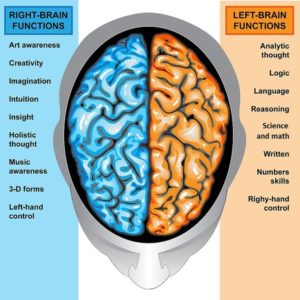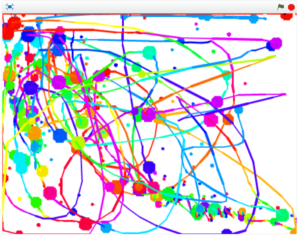My Orange Brain: Hemispheric Hegemon
Witzelsucht
If any of you have slogged through my previous book critiques, you know that I know how to analyze things. I can analyze something to death, then play devil’s advocate to reanimate it, then kill it again with a rejoinder. I can even analyze things that aren’t real, things I just make up in my mind.
For much of my life I’ve operated with only one operational brain hemisphere (the left one). And look where that got me! About the only time I used my right brain was to come up with jokes of varying quality. Mostly one-liners and puns. Unfortunately, rather than feeling relief that my right brain has at least one function, I might have cause to worry. This type of humor can be a sign of brain damage called Witzelsucht.
(Like I didn’t have enough problems to deal with. Now I’m turning German!
That was a joke. But it’s precisely that type of joke that proves I have more brain damage than I thought! 🙂 )
Orange Brain and Blue Brain

This handy picture from The Brain Made Simple illustrates my plight nicely. (I’m using mindfulness to soothe my analytical irritation at the picture’s inverted presentation, with the left-brain on the right and the right-brain on the left.)
I’m good at Orange Brain stuff. Blue Brain stuff, not as much. And I’m right-handed, which makes me even orange-er. I’m not even Dutch! (See? I’m hopeless.)
Let’s run down the Orange List (I’m correcting the picture’s typos because I can’t help myself):
- Analytic Thought: Duh.
- Logic: See title of blog.
- Language: I’ve already used the words “rejoinder” and “plight” and this article is only halfway through.
- Reasoning: I can come up with reasons for why I do anything, even if they’re wrong.
- Science/Math: I know the Pythagorean Theorem and all the planets in the solar system. Coincidence? I think not!
- Writing: I’m writing right now; also, I know how to use a semi-colon.
- Numbers Skills: I’m an accountant.
- Right-hand control: I always use my right hand when I’m trying to control someone or something.
Now the Blue List:
- Art Awareness: I was not aware awareness of art was something to be aware of before writing this article.
- Creativity: Every word I write uses the same 26 letters. Hardly creative.
- Imagination: Unless Excel has an imagination function I’m out of luck.
- Intuition: I thought only women had this?
- Insight: I wear glasses, so clearly my sight is lacking.
- Holistic Thought: I didn’t know you could have thoughts with holes in them. I’m way behind on this one.
- Music Awareness: Music is different than art? I wasn’t aware of that.
- 3D Forms: Every time I’ve drawn a circle or square they’ve only been 2D. Every. Single. Time.
- Left-Hand Control: Anyone who has seen me miss a putt on the golf course knows I lack left-hand control.
Blue Brain Life Support
Naturally, when I became aware of my atrophied right brain I just wanted to accept that it was broken and give up. But because I’m an enlightened man in recovery now, and because my brain is tuned to solve problems with analysis, logic, and reasoning, I am thinking about the right brain and ways to pump him up.
Early ideas include guitar, poetry, creative writing, and drawing/sketching. I have the tools to do all of these things, but sometimes have trouble doing them because I don’t feel the results are good enough. (A personal character defect is perfectionism.)
Of course, I could commit myself to posting X number of creative things on this blog, which would force me to do creative things. But that sounds dangerously close to a goal, which is scary. (A personal character defect is a fear of failure.)
As with…hold on. Someone’s talking to me.
OK, I just heard from my dad, literally in the middle of typing this article. He mentioned to me a tool called a Mind Map. I’d heard of these but never used them, because they don’t follow my favorite format (a spreadsheet) and because they look suspiciously like drawing, a creative Blue Brain activity.
When you’re writing an article about your creative dearth and you get interrupted with an idea to improve creativity, it’s probably God trying to tell me something. Message received!
Mind mapping, poetry, creative writing, guitar, drawing. I just need to pick one and do it (procrastination and slow decision-making are personal character defects).
Here’s a start at least: my own personal Jackson Pollock-style painting, courtesy of an online Pollock simulator. The great thing about abstract art is that there is no standard for what “good” is, so my analytical Orange Brain can’t rate its merit. It’s the artistic equivalent of trying to divide by zero.
LOL, take that Orange Brain!

